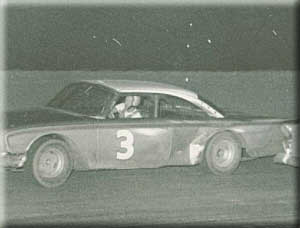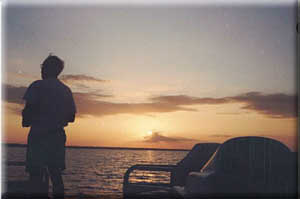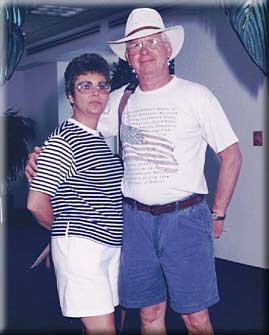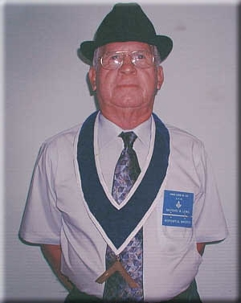Pillar Of Strength
Maynard Lewis is a 65-year old retired truck driver and foundry worker who lives in Eutawville, South Carolina with his wife Florence. Maynard and Florence have been married for 38 years. They have three adult children, seven grandchildren and two great-grandchildren. Needless to say, around the holidays, the Lewis house is jumping with the sounds of giggles, laughter and small feet running through the rooms, especially during Christmas when Maynard plays Santa, as he does every year.
Since he was a young boy growing up in South Carolina, Maynard has always loved the water. He spent as much of his free time as he could on a boat, fishing, hunting or swimming. Today, he remains an accomplished water skier, preferring to ski barefoot. It was a rite of passage in the Lewis house that as soon as the children were old enough, they were to ride on Maynard's shoulders while he water- skied. This tradition was passed on to Maynard's grandchildren. The Lewis family does not hesitate to climb aboard each others shoulders and form a pyramid. On a summer day out on the lake, you would think the entire family is a part of a professional water show as they race by, stacked three persons high.
When not skiing, Maynard can usually be found aboard his 28-foot pontoon boat barbecuing hotdogs and hamburgers for his family and friends. In between bites, he makes sure to check his always present bobber where a fresh worm is tied to a hook. There is nothing like fresh fish for an appetizer!
As Maynard grew up, he discovered another love, tinkering with engines. While a young man, he built his own race cars and raced them on local dirt tracks. He has always been a fan of racing. He and Florence mark their calendar every year and take their camper to several races including Daytona, Darlington, Rockingham and Atlanta.
His expertise under the hood carried over to all engines, including those that powered his boat and motorcycle. He states that he has "always been mechanically inclined." He has ridden motorcycles for over 20 years and in September of 2003, he purchased a mint-condition used Honda Goldwing, his long-time dream bike. Because of his illness, he has only been able to ride the bike once.

In June of 2003, Maynard noted a nagging pain on his right side that never seemed to go away. He also felt bloated and uncomfortable . He assumed that he had pulled a muscle. His primary care physician agreed but advised that if he did not see significant improvement he should consider contacting his urologist. He was told to take it easy for a few days, stay off the skis and sent home. Unfortunately, over the next few weeks the pain worsened.
Maynard had been treated years earlier for prostate cancer and had a full recovery. But when the pain did not subside Maynard followed his doctor's order and scheduled an appointment with his urologist. The urologist immediately ordered a CT scan to determine if the cancer had returned. The CT scan showed no recurrence of cancer but revealed evidence of fluid in his abdominal cavity. He was prescribed a cycle of antibiotics but the pain continued. Maynard continued to suffer.
His doctors were unable to determine the cause of the fluid and referred Maynard to a gastrologist. An appointment was made where Maynard would meet with the gastrologist in two weeks. However, on September 27, Maynard was rushed to the emergency room in Charleston, South Carolina complaining of dizziness and extreme nausea. He was admitted and underwent several gastrological and urological tests, including upper and lower gastrointestinal series. He was given antacids, a prescription for pain and sent home.
Maynard's condition worsened, and on October 9 he returned to his primary care physician. His examination was suspicious for a hernia. Maynard made an appointment to consult with a surgeon in Charleston but before he would make that appointment he was again rushed to the emergency room. Tests revealed fluid had accumulated in his abdomen. On October 11, he underwent a paracentesis in which fluid was removed from his stomach. Cytological tests upon the removed fluid were negative for a malignant process. Several pathologists examined the fluid and were unable to determine its cause.,

On October 14, Maynard underwent an exploratory laparoscopy. During the procedure, the doctors removed fluid for a second time. Upon entering the abdominal cavity, the surgeon noted the internal organs were inflamed, hardened and stuck together. He told the Lewis family that the organs looked like a "big red concrete block." After separating them as best he could, he removed several tissue specimens. The specimens were examined by more than one pathology laboratory outside of the hospital, including the Mayo Clinic. On October 21, the Mayo Clinic reported its diagnosis of malignant peritoneal mesothelioma.
Before his October 23, 2003 hospital discharge, Maynard and Florence consulted with an oncologist who explained to them that malignant mesothelioma is known as an incurable cancer but that there were experimental drugs available should he decide to seek treatment. The oncologist suggested he be treated with Alimta coupled with Cisplatin. He would undergo several treatments administered every 21 days. Maynard affirmed that he would "try anything to live" and decided to begin chemotherapy as soon as possible. Taking into consideration the necessary post-surgical recovery, Mr. Lewis was scheduled to begin chemotherapy treatments on November 19.
During the October 30 postoperative visit with the surgeon, a single-port catheter was inserted to assist in future blood work, chemotherapy treatments and feeding purposes. Between November 4 and November 30, 2003, Mr. Lewis underwent five ultra-sound guided paracenteses during which time approximately four gallons of fluid were removed from his abdomen.
Maynard was now nutritionally starved. His oncologist, concerned that he would not be able to begin his scheduled chemotherapy, put him on total parenteral nutrition (TPN). TPN, or hyperalimentaion infuses all needed nutrients into the body through a catheter inserted in a vein. Staff from the home health care agency trained Florence on the administration of home TPN usage. Slowly, Maynard's strength returned.
On November 19, Maynard had his first cycle of Alimta coupled with Cisplatin. Administration of the chemotherapy lasted approximately six hours. He returned to the cancer center the following day for blood work as well as to have his kidneys cleansed via intravenous fluids and then treated.

Maynard's treatments were interrupted on November 30, when he was admitted to the hospital after suffering from hallucinations accompanied with fever. He was diagnosed with a viral infection and pneumonia. Maynard's health rapidly declined. He was placed in isolation, pumped with antibiotics and units of blood, and was again placed on TPN. On December 4, Mr. Lewis was found to be in extreme pain, most probably as a result of constipation. An ultrasound noted several plugs in his bowels and on December 5, his bowels were flushed. He was discharged on December 7. On December 10 he received his second chemotherapy treatment. Since his treatments began, the fluid has not returned to his abdominal cavity. The last paracentesis was on December 23, 2003. Since the diagnosis, Maynard has received over 10 pints of blood.
Maynard plans to continue chemotherapy treatments as long as he can. However, the side effects of chemotherapy have been debilitating for Maynard. He requires constant medication to combat the nausea. Neurological damage to a nerve in his lower right leg has caused his right front foot to droop. He now wears a foot brace to keep from tripping. The fatigue, depression and constant anxiety of knowing that he has an incurable disease has become a living nightmare for him. But he states affirmatively that he will continue to fight his cancer.
On March 24, Maynard met with an audiologist, he was losing his hearing. The doctors discovered nerve damage and Maynard now wears hearing aides.
He says he is ready to "whip it!" using any and all possible treatments available, as these are "the only chance I have." Maynard says he's not afraid to die, he is "just not ready to die. I got too many things I'd like to do in my life."
It is hard to reconcile the past and present of Maynard Lewis: a man who just a short while ago was the picture of health, forming the base of a ski pyramid, bearing the weight of his family on his shoulders, now struggles to walk with a foot brace and hearing loss. He desperately clings to the hope that if he sticks to his grueling treatment, he will buy some time, and in that time new and better treatments will come. He believes that if he just keeps getting back up, eventually he'll be back in the sun, on skis, on the water. We are pulling for you, Maynard.
*** POSTED MARCH 29, 2004 ***


